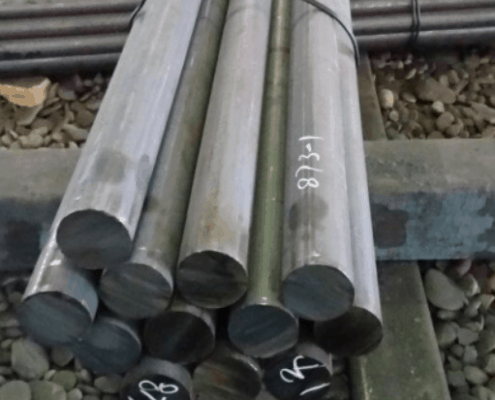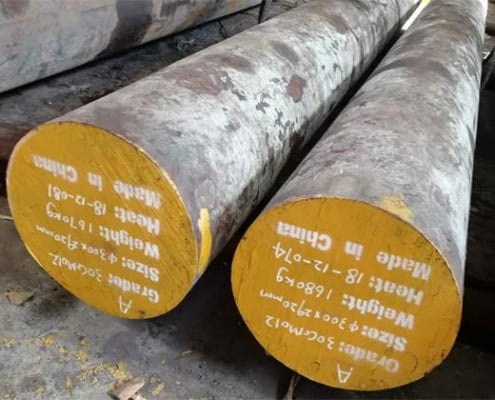DIN 1.7225 Steel |AISI 4140 | 42CrMo4 | SCM440
DIN 1.7225 Steel : High strength, hardenability, good toughness, and small deformation during quenching. High creep strength and lasting strength at high temperature.
DIN 1.7225 Steel Supply Form & Size & Tolerance
| Supply Form | Size(mm) | Process | Tolerance | |
| Round | Φ6-Φ100 | Cold Drawn | Bright/Black | Best H11 |
| Φ16-Φ350 | Hot Rolled | Black | -0/+1mm | |
| Peeled/ground | Best H11 | |||
| Φ90-Φ1000 | Hot Forged | Black | -0/+5mm | |
| Rough Turned | -0/+3mm | |||
| Flat/Square/Block | Thickness :120-800 | Hot Forged | Black | -0/+8mm |
| Width:120-1500 | Rough Machined | -0/+3mm | ||
DIN 1.7225 Steel Standard
| Grade : | 42CrMo4 |
| Number: | 1.7225 |
| Classification: | Alloy special steel |
| Standard: | EN 10083-3: 2006 Steels for quenching and tempering. Technical delivery conditions for alloy steels EN 10132-3: 2000 Cold rolled narrow steel strip for heat treatment. Technical delivery conditions. Steels for quenching and tempering EN 10305-1: 2010 Steel tubes for precision applications. Seamless cold drawn tubes. Technical delivery conditions EN 10269: 1999 Steels and nickel alloys for fasteners with specified elevated and/or low temperature properties EN 10263-4: 2001 Steel rod, bars and wire for cold heading and cold extrusion. Technical delivery conditions for steels for quenching and tempering EN 10250-3: 2000 Open steel die forgings for general engineering purposes. Alloy special steels EN 10297-1: 2003 Seamless circular steel tubes for mechanical and general engineering purposes. Non-alloy and alloy steel tubes. Technical delivery conditions |
DIN 1.7225 Steel Equivalent grades:
| EU EN | USA | Germany | Japan | France | England | Italy | Spain | China | Sweden | Finland | Russia | Inter |
| – | DIN,WNr | JIS | AFNOR | BS | UNI | UNE | GB | SS | SFS | GOST | ISO | |
| 42CrMo4 (1.7225) | 4140 4142 | 42CrMo4 | SCM440H | 42CD4 | 708M40 CFS11 | 42CrMo4 | 40CrMo4 F1252 | 42CrMo | 2244 | 42CrMo4 | 35KHM 38KHM | 42CrMo4 |
DIN 1.7225 Steel Chemical Composition
| Standard | Grade | C | Si | Mn | P | S | Cr | Ni | Mo |
| ASTM A29 | 4140 | 0.38-0.43 | 0.15-0.35 | 0.75-1.00 | ≤ 0.035 | ≤ 0.04 | 0.8-1.1 | – | 0.15-0.25 |
| EN10083 | 42CrMo4 | 0.38-0.45 | ≤ 0.4 | 0.6-0.90 | ≤ 0.025 | ≤ 0.035 | 0.9-1.2 | – | 0.15-0.30 |
| 1.7225 | |||||||||
| JIS G4105 | SCM440 | 0.38-0.43 | 0.15-0.35 | 0.6-0.85 | ≤ 0.035 | ≤ 0.04 | 0.9-1.2 | – | 0.15-0.30 |
| GB 3077 | 42CrMo | 0.38-0.45 | 0.17-0.37 | 0.5-0.80 | ≤ 0.035 | ≤ 0.035 | 0.9-1.2 | – | 0.15-0.25 |
| BS 970 | EN19 | 0.35-0.45 | 0.15-0.35 | 0.5-0.80 | ≤ 0.035 | ≤ 0.035 | 0.9-1.5 | – | 0.2-0.40 |
DIN 1.7225 Steel Physical Property
| Density g/cm3 | 7.85 | ||||
| Melting point °C | 1416 | ||||
| Poisson’s ratio | 0.27-0.30 | ||||
| Machinability (AISI 1212 as 100% machinability) | 65% | ||||
| Thermal expansion co-efficient µm/m°C | 12.2 | ||||
| Thermal conductivity W/(m.K) | 46 | ||||
| Modulus of elasticity 10^3 N/mm2 | 210 | ||||
| Electric resistivity Ohm.mm2 /m | 0.19 | ||||
| Specific heat capacity J/(kg.K) | 460 | ||||
| Modulus of elasticity 10^3 N/mm2 | 100 ℃ | 200 ℃ | 300 ℃ | 400 ℃ | 500 ℃ |
| 205 | 195 | 185 | 175 | 165 | |
| Thermal expansion 10^6 m/(m.K) | 100 ℃ | 200 ℃ | 300 ℃ | 400 ℃ | 500 ℃ |
| 11.1 | 12.1 | 12.9 | 13.5 | 13.9 | |
DIN 1.7225 Steel Mechanical Property
| Mechanical Condition | R | S | S | T | U | V | W |
| Ruling Section mm | 250 | 250 | 150 | 100 | 63 | 30 | 20 |
| Tensile Strength Mpa | 700-850 | 770-930 | 770-930 | 850-1000 | 930-1080 | 1000-1150 | 1080-1230 |
| Yield Strength Mpa Min | 480 | 540 | 570 | 655 | 740 | 835 | 925 |
| Elongation % | 15 | 13 | 15 | 13 | 12 | 12 | 12 |
| Izod Impact J Min | 34 | 27 | 54 | 54 | 47 | 47 | 40 |
| Charpy Impact J Min | 28 | 22 | 50 | 50 | 42 | 42 | 35 |
| Hardness Brinell HB | 201-255 | 233-277 | 233-277 | 248-302 | 269-331 | 293-352 | 311-375 |
DIN 1.7225 Steel High Temperature Strength
| For quenched and tempered heavy forgings | |||||||
| Diameter mm | Yield strength MPa | ||||||
| 20 ℃ | 100 ℃ | 200 ℃ | 250 ℃ | 300 ℃ | 350℃ | 400℃ | |
| ≤250 | 510 | 486 | 461 | 441 | 422 | 392 | 363 |
| 250-500 | 460 | 431 | 412 | 402 | 382 | 353 | 324 |
| 500-750 | 390 | 333 | 333 | 324 | 304 | 275 | 245 |
Forging
Forging temperature should be carried out between 900℃-1200℃,The lower the forging-ending temperature ,the finer the grain size .Hold the temperature till uniform before forge,minimum forging temperature 850°C,so don’t forge below 850℃.1.7225 steel should be cooled as slowly as possible in still air or in sand after forged.
Normalizing
Normalizing is used to refine the structure of forgings that might have cooled non-uniformly after forged,and considered as a conditioning treatment before final heat treatment.Normalizing temperature for 1.7225 steel should be carried out between 870℃-900℃. hold suitable time for the steel to be thoroughly heated to complete the ferrite to austenite transformation.Cool in still air.
Annealing
After Forged,1.7225 steel may be annealed .Annealing temperature should be carried out between 800℃-850℃, hold suitable time for the steel to be thoroughly heated. Cool slowly in the furnace.This treatment will form a structure suitable for machining.The maximum Hardness is 241 HB.
Hardening
This heat treatment will obtain martensite structure after quenched.It should be carried out between 840℃-875℃, hold suitable time for the steel to be thoroughly heated, soak for 10-15 minutes per 25 mm section, and quench in oil, water, or polymer as required.Tempering should be followed immediately after quenched.
Tempering
Tempering is usually carried out to relieve stresses from the hardening process, but primarily to obtain the required hardness and mechanical properties. The actual tempering temperature will be chosen to meet the required properties.Heat the 1.7225 carefully to a suitable temperature ,usually between 550℃-700℃, soak at the temperature for 2 hours per 25mm of ruling section, then cool in air.Tempering between 250℃-375℃ is not avoided as tempering within this range will seriously reduce the impact value,result in temper brittleness .
Application
1.7225 steel finds many applications as forgings for the aerospace,oil and gas,automotive, agricultural and defense industries etc.
Typical applications for 4140 steel uses include:forged gears,spindles,fixtures,jigs,collars,Axles,conveyor parts,crow bars,logging parts,shafts,sprockets,studs,pinions,pump shafts, rams, and ring gears etc









